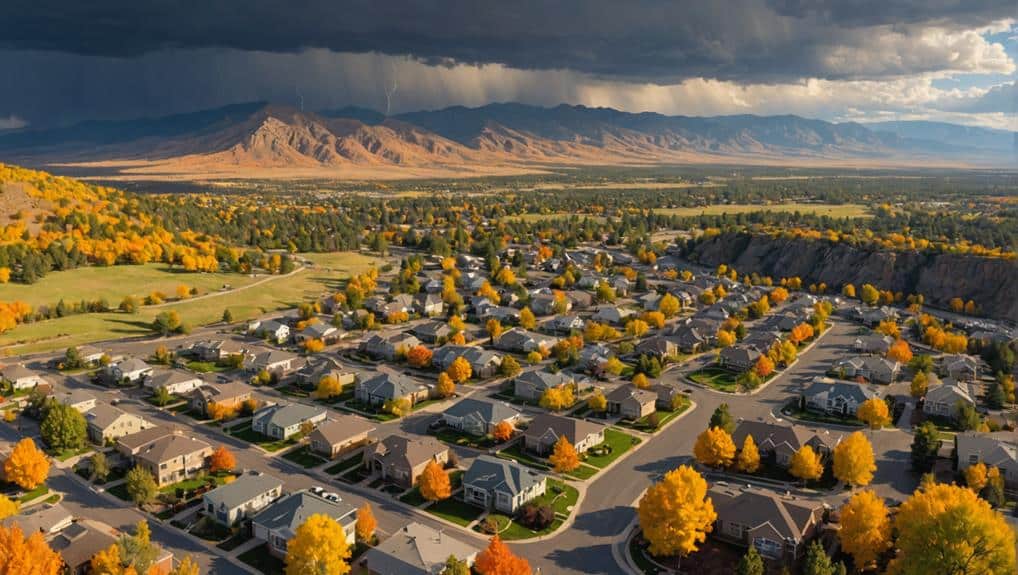At Restoration Colorado Springs, we're experts in flood restoration for the 80923 area. We provide 24/7 emergency response with advanced water extraction techniques and industrial-grade equipment. Our certified professionals conduct thorough damage assessments, develop tailored restoration plans, and work efficiently to minimize damage. We've seen a 15% increase in flood-related claims in 80923 over the past year, making our rapid response essential. Our team is committed to rebuilding lives and communities in Colorado Springs, offering seamless insurance assistance to streamline the claims process. We'll explore the unique challenges of mold growth in 80923's semi-arid climate and how seasonal weather impacts restoration efforts.
Need Flood Restoration? Get Help Now from Restoration Colorado Springs
Three essential factors make Restoration Colorado Springs your ideal choice for flood restoration: our 24/7 emergency response, advanced water extraction techniques, and detailed damage assessment process. We're committed to minimizing damage and beginning restoration promptly, regardless of when disaster strikes. Our rapid response team is always ready to deploy, ensuring we're on-site quickly to assess and contain the situation.
We employ state-of-the-art water extraction equipment to efficiently remove standing water and moisture from your property. Our advanced techniques include high-powered pumps, industrial-grade dehumidifiers, and specialized drying systems designed to tackle even the most severe flooding scenarios.
Our thorough damage assessment process is vital for effective restoration. We conduct a meticulous inspection of your property, identifying all areas affected by water damage, including hidden moisture pockets. This detailed evaluation allows us to develop a tailored restoration plan that addresses all aspects of the damage.
About Restoration Colorado Springs
Restoration Colorado Springs stands out as a premier restoration company, bringing together a team of certified professionals with extensive experience in flood, fire, and mold remediation. We've built our reputation on a foundation of rapid response, thorough damage assessment, and advanced restoration techniques. Our 24/7 emergency service guarantees we're always ready to tackle your restoration needs, minimizing damage and initiating the recovery process swiftly.
We employ state-of-the-art equipment and methodologies to restore your property efficiently and effectively. Our process begins with a detailed inspection, followed by damage containment, meticulous restoration execution, and a final quality check. We're committed to delivering results that meet our high standards and exceed your expectations.
At Restoration Colorado Springs, we recognize the stress and disruption caused by property damage. That's why we offer seamless insurance assistance, working directly with your insurance company to streamline the claims process. Our goal is to alleviate your burden and guarantee you receive the coverage you're entitled to. With our expertise and dedication, we're not just restoring properties; we're helping rebuild lives and communities in Colorado Springs.
Additional Information About 80923

We've identified several factors contributing to mold growth in 80923, including poor ventilation, water leaks, and high humidity levels. Seasonal weather patterns in 80923 considerably impact mold proliferation, with increased moisture during spring and summer months creating ideal conditions for spore development. Our expertise in mold remediation allows us to effectively address these issues, implementing targeted solutions that account for the area's unique climate and environmental factors.
Reasons for Mold in 80923
Colorado Springs' 80923 zip code's unique environmental conditions contribute to an increased risk of mold growth in residential and commercial properties. We've identified several key factors that make this area particularly susceptible to mold issues.
First, the region's semi-arid climate, characterized by low humidity levels, can lead to unexpected moisture problems. When humidity suddenly increases, it can cause condensation on cool surfaces, creating ideal conditions for mold growth. Additionally, 80923's proximity to natural water sources, such as creeks and underground springs, can result in higher groundwater levels, potentially leading to basement moisture issues.
The area's soil composition, which often includes clay, can exacerbate water drainage problems around foundations. This poor drainage can lead to water accumulation and, subsequently, mold growth. Moreover, the frequent temperature fluctuations in Colorado Springs can cause pipes to expand and contract, increasing the risk of leaks that may go unnoticed until mold has already taken hold.
Lastly, the prevalence of older homes in 80923 with outdated ventilation systems can contribute to poor indoor air quality and moisture control, further promoting mold growth. Understanding these factors is vital for effective mold prevention and mitigation in this area.
How Does Seasonal Weather in 80923 Affect Mold?
Throughout the year, 80923's distinct seasonal weather patterns greatly influence mold growth and proliferation in both residential and commercial properties. In spring, we often see increased mold activity due to rising temperatures and higher humidity levels, combined with frequent rain showers. This creates ideal conditions for mold spores to thrive and spread rapidly.
Summer in 80923 brings warmer temperatures and occasional thunderstorms, which can lead to sudden moisture intrusions. We've observed that poorly ventilated spaces are particularly susceptible to mold growth during this season. As fall approaches, the cooler temperatures and falling leaves can create damp environments around foundations, promoting mold growth in basements and crawl spaces.
Winter in 80923 presents unique challenges. The cold, dry air often leads to increased indoor humidity as residents heat their homes. We've found that this, coupled with poor insulation, can result in condensation on windows and walls, creating perfect conditions for mold. Additionally, snow accumulation and subsequent melting can lead to water infiltration, further exacerbating mold issues.
To combat these seasonal mold risks, we recommend implementing proper ventilation, maintaining consistent indoor humidity levels, and addressing any water intrusions promptly.
Frequently Asked Questions
How Long Does the Flood Restoration Process Typically Take?
The duration of the flood restoration process varies depending on the extent of damage. We typically complete minor restorations within 3-5 days, while more severe cases can take 2-4 weeks. Our team works efficiently to minimize disruption to your life. We'll provide a detailed timeline after our initial assessment. Factors affecting duration include the size of the affected area, water contamination level, and structural damage. We'll keep you informed throughout the process.
Can I Stay in My Home During Flood Restoration?
We generally advise against staying in your home during flood restoration. The process involves extensive drying, potential demolition, and the use of specialized equipment. It's often unsafe due to electrical hazards, contaminated water, and mold risks. We'll need unrestricted access to affected areas, which can disrupt daily life. However, in some cases, if only a small portion of your home is affected, we may be able to isolate the area, allowing you to occupy unaffected spaces safely.
Will Flood Restoration Eliminate All Potential Mold Growth?
While we endeavor to eliminate all potential mold growth during flood restoration, we can't guarantee 100% prevention. We use advanced techniques and equipment to thoroughly dry affected areas and apply antimicrobial treatments. However, mold spores are microscopic and ubiquitous in the environment. We strongly recommend ongoing vigilance and maintenance, including proper ventilation and moisture control. If you notice any signs of mold after restoration, we advise contacting us immediately for a follow-up inspection and remediation if necessary.
Are Flood Restoration Services Covered by Standard Homeowners Insurance Policies?
We can't give a definitive answer as insurance coverage varies widely between policies. Generally, standard homeowners insurance covers sudden and accidental water damage, but not flooding from natural disasters. Many policies exclude flood damage, requiring separate flood insurance. It's essential to review your specific policy or consult your insurance provider. We recommend homeowners carefully examine their coverage and consider additional flood insurance if they're in flood-prone areas. We're happy to assist with insurance claims for covered damages.
What Precautions Should I Take to Prevent Future Flooding?
To prevent future flooding, we recommend several key precautions. First, install and maintain proper drainage systems, including gutters, downspouts, and French drains. Second, guarantee your property's grading slopes away from the foundation. Third, install backflow prevention devices on sewer lines. Fourth, consider waterproofing your basement or crawl space. Finally, we advise creating an emergency plan and keeping essential items elevated. Regular inspections and maintenance of these systems are vital for long-term flood prevention.
